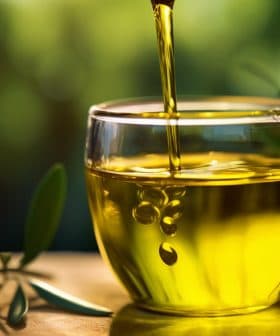How to Reuse Olive Oil for Sautéing and Frying
Deep frying with olive oil is healthier than frying with other oils, and it can be reused several times, with some caution, to reduce waste and enhance flavors.
 18.0K reads
18.0K readsConsumers are increasingly aware of olive oil’s health benefits, with a growing body of research showing that olive oils are the most balanced, safe, and healthy fat for both pan-frying and deep-frying. While olive oil is more expensive than other common cooking oils, its high stability and antioxidant content make it ideal for deep-frying, as it can be reused several times before needing to be discarded and changed. Additionally, refined olive oils labeled as “light” lack the polyphenols and antioxidants of extra virgin olive oil, diminishing their health benefits.
Consumers are increasingly aware of olive oil’s health benefits. While many use olive oil to pan-fry or sauté at home, only a fraction of deep-frying enthusiasts turn to olive oil.
Still, a growing body of research shows that olive oils are the most balanced, safe and healthy fat for both pan-frying and deep-frying.
Moreover, when reusing frying oil more than once, nothing is better than olive oil.
See Also:Olive Oil Basics“I do not usually deep fry at home, but should I do that, I would certainly use olive oil, which I commonly use for all of our household cooking,” Guy Crosby, a professor at the Harvard T.H.Chan School of Public Health’s nutrition department, told Olive Oil Times.
One of the reasons many shun olive oils for deep-frying is their relatively higher prices than other common cooking oils.
Whether it is canola oil, corn oil or sunflower oil, most cooking oils usually come with a lower price tag than olive oil, let alone the highest grade: extra virgin olive oil.
On top of that, frying oils are cumbersome, as relevant volumes are used for deep-frying and need to be adequately disposed of after use. This, and their price tag, make reusing frying oils a highly sensitive subject.
Why EVOO’s unique profile makes it the best deep-frying oil
In the past few decades, many researchers have focussed on how olive oil is affected by frying.
For example, a 2022 study published in Food Chemistry found that frying with virgin olive oil results in French fries with some of the oil’s healthy qualities; frying with virgin olive oil proved to be more beneficial than using less antioxidant-rich cooking oils to fry.
The antioxidants in extra virgin olive oil and unique anti-inflammatory compounds such as oleocanthal make it the ideal candidate for deep-frying.
“Olive oil and extra virgin olive oils are certainly used for deep-fat frying, and you can certainly reuse them, as they are some of the most stable frying oils that you can buy,” Crosby said.
When sautéing or frying, all vegetable oils are subjected to modification and oxidation. These reactions are mitigated in olive oils because of the high presence of monounsaturated oleic acid.
See Also:Cooking With Extra Virgin Olive OilExtra virgin and virgin olive oils also boast a high volume of antioxidant polyphenols, such as tyrosol and hydroxytyrosol. In different measures, they show resilience to frying.
Crosby cited a lab experiment that showed how frying potatoes in virgin olive oil for 10 minutes at 180 °C (356 ºF) halved hydroxytyrosol levels, which fell to 10 percent of the original amount after being reused for frying six times.
On the other hand, tyrosol degraded by only 20 percent even after being reused for frying 12 times.
“What happens there is that the antioxidants in virgin olive oils protect the fatty acids from oxidation,” Crosby said.
Oxidation
In the context of health and biology, oxidation refers to a process that occurs in the body involving the production of reactive oxygen species (ROS) or free radicals. These are highly reactive molecules that contain oxygen and can cause damage to cells, tissues, and biological molecules like proteins, lipids, and DNA.
Oxidative stress is a condition that arises when there is an imbalance between the production of ROS and the body’s antioxidant defenses. Normally, the body has built-in defense mechanisms, such as antioxidants, that help neutralize and remove ROS. However, when there is an excess of ROS or a deficiency in antioxidants, oxidative stress can occur.
Oxidative stress has been implicated in various health conditions and diseases, including aging, cardiovascular diseases, neurodegenerative disorders (such as Alzheimer’s and Parkinson’s), cancer, diabetes, and inflammatory conditions. ROS can initiate chain reactions that damage cellular structures and impair normal cellular functions, leading to tissue damage and disease progression.
Antioxidants, both endogenous (produced within the body) and exogenous (obtained from diet or supplements), play a crucial role in combating oxidative stress by neutralizing ROS and minimizing their harmful effects. Common antioxidants include vitamins C and E, beta-carotene, selenium, and various phytochemicals found in fruits, vegetables, and other plant-based foods.
Maintaining a balance between oxidative stress and antioxidants is important for overall health and well-being. Lifestyle factors such as a healthy diet rich in antioxidants, regular exercise, stress management, and avoiding exposure to environmental toxins can help mitigate oxidative stress and promote good health.
“While re-use for deep frying will eventually decrease polyphenols and antioxidants found in EVOOs, this will only partially affect a crucial anti-inflammatory agent found in extra virgin olive oil and in virgin olive oils only, which is oleocanthal,” Crosby said.
Oleocanthal is one of the most interesting phenolic components of extra virgin olive oil.
Its impact on health is the subject of many ongoing studies. Those studies show evidence of highly significant effects, from its anti-cancer properties to preventing neurodegenerative disorders.
Even if heated for long periods at very high temperatures, such as 240 °C (464 ºF) in a lab experiment, oleocanthal only partially degrades its biological activity.
How to safely reuse EVOOs for deep-frying
Reusing extra virgin olive oils for deep frying requires the same care when other frying fats are brought into play.
When food is deep-fried, some of its particles end up in the frying oil, contaminating it. To reuse it more than once, oil should then be carefully filtered. “Contamination is a major aspect to consider,” Crosby noted.
“Think of what might happen in some fast foods. If you do not adequately filter and change whatever frying oils you are using, if you do not keep it fresh, that can become an issue,” he added, referring to research linking excessive consumption of fast foods’ fried servings to heart problems.
See Also:Extra Virgin Olive Oil Better for Frying FishCorrectly filtering deep frying oil before reuse is crucial, as this prevents those oil’s smoke points from being reduced dramatically after each use.
The smoke point for filtered extra virgin olive oil is 207 °C (405 ºF), which is well above the deep-frying temperature, which rarely exceeds 190 °C (374 ºF). The smoke point is highly relevant as triglyceride molecules break apart, and the toxic acrolein aldehyde is formed above this threshold.
“Extra virgin olive oil has a reasonably high smoking point,” Crosby said. “But again, the more any frying oil is used, the more contaminated it will be from the food or the moisture of the food and more. As food particles decompose and oxidize, the smoke point will decrease substantially each time.”
This is also why filtered EVOOs have a higher smoking point than unfiltered products, as the latter will contain olive particles.
Keeping track of oxidation while deep-frying once or more
EVOOs and refined olive oils come with different price tags. They also bear significant differences in their quality profiles. These differences emerge when considering deep-frying and olive oil reuse.
Among cooking olive oils, extra virgin olive oil shows higher stability during cooking or frying due to the significant presence of antioxidants.
See Also:Study Links Cooking Methods and HealthThe oxidation process leads to the release of specific compounds, which can impact health. “Oxidation in a deep fat fryer is a significant issue,” Crosby said. “Vegetable oils other than EVOOs commonly used for frying, such as soybean or canola oils, tend to oxidize a lot.”
“The oxidation products have not been thoroughly proven to constitute a health hazard,” he added. “Yet, it is pretty well accepted that such oxidation products are a health risk as they begin to build up.”
“Thanks to its polyphenols, extra virgin olive oil tends to build up much fewer oxidation products, allowing it to be reused at least several times before having to discard it and change it,” Crosby noted.
What about deep-frying with the so-called light olive oils?
Refined olive oils are often sold as “light” olive oil, and producers encourage their use in sautéing and deep frying.
These products are usually cheaper than extra virgin olive oil. They are meant to bring olive oil to the household without the more robust flavors usually found in virgin or extra virgin olive oil (which are provided by polyphenols).
“Some of those light olive oils that are usually filtered might even have a higher smoking point than extra virgin olive oil,” Crosby said.
“That is a favorable characteristic when used in a deep fat fryer, but, on the other hand, they lack the polyphenols and antioxidants of extra virgin olive oil,” he added.
The refined olive oil production process implies using heat and chemicals which allow the extraction of oil from olives that have already been pressed. “Such production process reduces substantially the healthy contents,” Crosby said.
“That means that if you switch to the light olive oil, you are losing the health benefits of the high content of polyphenols in extra virgin olive oil,” he concluded.
Know the Basics
Things to know about olive oil, from the Olive Oil Times Education Lab.
Extra virgin olive oil (EVOO) is simply juice extracted from olives without any industrial processing or additives. It must be bitter, fruity and pungent — and free of defects.
There are hundreds of olive varieties used to make oils with unique sensory profiles, just as many varieties of grapes are used in wines. An EVOO can be made with just one variety (monovarietal) or several (blend).
Extra virgin olive oil contains healthy phenolic compounds. Substituting a mere two tablespoons of EVOO per day instead of less healthy fats has been shown to improve health.
Producing high-quality extra virgin olive oil is an exceptionally difficult and costly task. Harvesting olives earlier retains more nutrients and extends shelf life, but the yield is far less than that of fully ripe olives that have lost much of their healthy compounds.
Share this article










